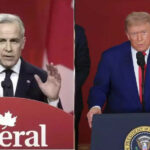This article is an onsite version of our Europe Express newsletter. Sign up here to get the newsletter sent straight to your inbox every weekday and Saturday morning. Explore all of our newsletters here
Welcome back. Fresh from victory in June’s European parliament elections, Austria’s far-right Freedom party (FPÖ) is setting its sights on winning national legislative elections set for September 29. On Wednesday, the party published its campaign manifesto — more on that below.
Should the FPÖ win next month, the implications for the rest of Europe would be serious — not least because of the party’s sympathy for Russia and the fallout from an espionage scandal of a kind all too familiar in Austria in recent times. You can find me at tony.barber@ft.com.
The Austrian exception
Across Europe, conservative nationalist, hard-right and more extreme rightwing parties have had mixed results over the past two years. The Brothers of Italy won that country’s 2022 elections, but as part of a broad conservative coalition, not on its own.
In the Netherlands, the Freedom party won elections last November and now forms part of the ruling coalition. A month earlier, however, Poland’s Law and Justice party lost power. In June, France’s Rassemblement National won the EU elections, but its hopes of grabbing a share of power at national level were thwarted in parliamentary elections held immediately afterwards.
Austria is something of a special case.
The FPÖ’s victory in the EU elections marked the first time that it had topped a nationwide poll in Austria. However, unlike other parties of its type, it is no stranger to power. Since its foundation in 1956, it has served in three government coalitions — from 1983 to 1986, 2000 to 2006 and 2017 to 2019.
For many Austrian voters, the FPÖ is a perfectly normal part of the national political scene — notwithstanding the fact that its extreme-right profile has acquired even sharper features under Herbert Kickl, its leader since 2021.
If you read German, I recommend a new book by veteran Austrian legislator Peter Pilz — Ostblock: Putin, Kickl und ihre ÖVP (Eastern Bloc: Putin, Kickl and their ÖVP).
Among other topics, the book asks whether the ÖVP — the conservative Austrian People’s party, currently in power — might form the next government with the FPÖ. It also discusses whether Austria under Kickl could become Vladimir Putin’s “next stronghold in central Europe, as Hungary has” — to quote from a review by Edina Paleviq for the Europe Now journal.
No simple road to power
For the FPÖ, the road to a fourth spell in government promises to be complicated.
With 25.4 per cent of the vote in the EU elections, the party won but performed less well than expected. The ÖVP, with 24.5 per cent, and the Social Democrats, with 23.2 per cent, finished a close second and third.
In the run-up to next month’s elections, opinion polls show the FPÖ in the lead, but by no means guaranteed to come first, and certainly in no position to form a government without a coalition partner. The party might not even be able to place one of its nominees in the chancellorship — a post it has so far never held.

Marcus How, head of research and analysis at ViennEast Consulting in Vienna, comments:
Even if the FPÖ comes first, it is not a foregone conclusion that it will form the next government. Officially, it has no viable coalition partners because all parties are opposed to co-operating with Kickl in particular.
They are backed by President Alexander Van der Bellen — formerly leader of the Greens — who specifically stated that he would not necessarily mandate the FPÖ to lead coalition negotiations, citing its “anti-European” stance and refusal to condemn Russia’s invasion of Ukraine.
An aversion to Kickl
The last time the FPÖ was in office, it shared power with the ÖVP. That remains a plausible scenario after next month’s elections, but the key question is whether Kickl would approve such a coalition if the price to be paid were his own exclusion from office.
Karl Nehammer, Austria’s ÖVP chancellor, is on record as saying: “You can’t make a state with Kickl.”
Gabriela Greilinger, writing for Social Europe, explains why Nehammer is reluctant to share power with Kickl:
Nehammer’s aversion to the FPÖ leader has long been known.
This probably originates from Nehammer’s assumption of the interior ministry, following snap elections after the turbulent break-up of the 2017-2019 ÖVP- FPÖ coalition in the face of the “Ibizagate” scandal. The ministry was allegedly in bad shape after Kickl’s tenure — so much so that many allied intelligence services did not trust Austria any more.
You will find details of “Ibizagate” — an affair in which FPÖ leaders were caught on video discussing sleazy business deals with a woman purporting to be the niece of a Russian oligarch — in my newsletter on Austria a year ago.
Espionage scandal
If Ibizagate was bad, the so-called Ott affair is potentially much worse. In this in-depth report, the FT’s Sam Jones provides the details.
Egisto Ott, a former Austrian intelligence agent, was taken into custody in March on suspicion of spying for Russia. He denies the accusation, and no formal charges have been levelled at him. He was released in June but kept under investigation.

The Austrian police warrant for Ott’s arrest contended that he was commissioned by Jan Marsalek, a fugitive former senior executive of Wirecard, the collapsed German financial services firm, to assist Russian espionage around Europe.
Marsalek, an Austrian citizen who was deeply implicated in the Wirecard fraud and is now believed to be in Russia, is regarded by western intelligence agencies as having been a longtime operative for Moscow.
Now the FPÖ is fighting against accusations from its political rivals that
some of Ott’s alleged activities on behalf of Russia occurred while Kickl was Austria’s interior minister.
Kickl and the FPÖ not only deny any wrongdoing, but point out — not without reason — that any lapses in national security could be blamed on the ÖVP. After all, the mainstream conservatives were the dominant party in the 2017-2019 coalition.
Russia in Austrian politics
The fact remains that most Austrian parties have taken a lenient view of Russia for many decades, but the FPÖ is the most pro-Kremlin of them all — although you would not necessarily reach this conclusion after looking at its election manifesto.
That plays down the party’s connections to Russia and emphasises other themes that it believes will resonate with voters — how to control immigration, the role of Islam in Austrian society and the state of the economy (here in German is the FPÖ’s summary of its programme, labelled “Fortress Austria. Fortress of Freedom”).
The FPÖ skilfully conceals its Russophile sympathies behind the cloak of Austrian neutrality, which is undoubtedly dear to voters. Aimé Mühlemann, writing for the European Horizons Editorial Board site, says:
Austria has yet to accept the changing realities of Europe since the cold war . . . the population continues to see itself as a mediating country between Russia and the west, exemplified in the continued import of the majority of its gas from Russia and business with its companies . . .
Western intelligence agencies have grown increasingly reluctant to share sensitive information with Austria due to its close connections with Russia.
‘Stop EU madness’
How disruptive for the EU would the next Austrian government be, if it contained or were led by the FPÖ?
In propaganda and rhetoric, the FPÖ’s hostility to the EU sets it apart from all mainstream Austrian parties. Before the European parliament elections, the FPÖ campaigned under the slogan “EU-Wahnsinn stoppen” (stop EU madness).

According to the European Commission’s regular Eurobarometer surveys, Austrians tend to have somewhat more negative views of the EU than do European citizens on average.
However, the FPÖ does not seriously pursue the goal of Öxit, or Austria’s exit from the EU. Rather, like Hungarian premier Viktor Orbán or French far-right leader Marine Le Pen, the party aims to transform the EU from within into a loose collection of nation-states.
In this spirit, the FPÖ is one of the three founding parties — along with Orbán’s Fidesz and the Ano movement of former Czech premier Andrej Babiš — of a new hard-right European parliament political group called Patriots for Europe.
Should the FPÖ lead or be part of Austria’s next government, it would certainly add its voice to those demanding a less pro-Ukrainian policy in the war with Russia, and to those resisting the EU’s new asylum and migration pact.
All in all, quite a headache for the EU, whose leaders we can be sure will follow Austria’s election campaign with close attention.
Dancing with Putin: why Austria is still so close to the Kremlin — an analysis by Meret Baumann for the Neue Zürcher Zeitung
Tony’s picks of the week
-
Fund managers, bankers and companies that used to raise capital in Saudi Arabia are feeling the effects as the kingdom switches the investment focus of its $925bn sovereign wealth fund to domestic priorities, the FT’s Andrew England, Chloe Cornish and Brooke Masters report
-
Pro-Kremlin social media accounts in Germany that spread far-right messages and conspiracy theories are often linked to individuals with a Russian background or family history, Sophia Winkler writes for the Berlin-based Centre for East European and International Studies






